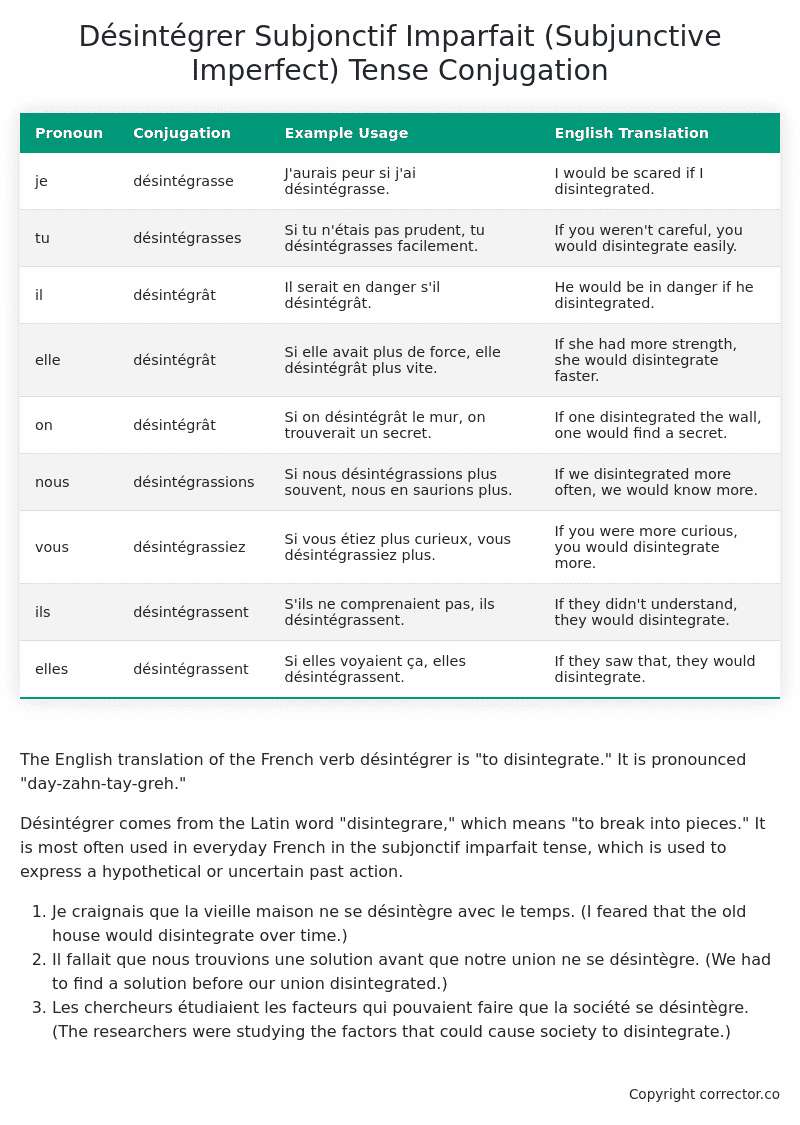Subjonctif Imparfait (Subjunctive Imperfect) Tense Conjugation of the French Verb désintégrer
Introduction to the verb désintégrer
The English translation of the French verb désintégrer is “to disintegrate.” It is pronounced “day-zahn-tay-greh.”
Désintégrer comes from the Latin word “disintegrare,” which means “to break into pieces.” It is most often used in everyday French in the subjonctif imparfait tense, which is used to express a hypothetical or uncertain past action.
- Je craignais que la vieille maison ne se désintègre avec le temps. (I feared that the old house would disintegrate over time.)
- Il fallait que nous trouvions une solution avant que notre union ne se désintègre. (We had to find a solution before our union disintegrated.)
- Les chercheurs étudiaient les facteurs qui pouvaient faire que la société se désintègre. (The researchers were studying the factors that could cause society to disintegrate.)
Table of the Subjonctif Imparfait (Subjunctive Imperfect) Tense Conjugation of désintégrer
| Pronoun | Conjugation | Example Usage | English Translation |
|---|---|---|---|
| je | désintégrasse | J’aurais peur si j’ai désintégrasse. | I would be scared if I disintegrated. |
| tu | désintégrasses | Si tu n’étais pas prudent, tu désintégrasses facilement. | If you weren’t careful, you would disintegrate easily. |
| il | désintégrât | Il serait en danger s’il désintégrât. | He would be in danger if he disintegrated. |
| elle | désintégrât | Si elle avait plus de force, elle désintégrât plus vite. | If she had more strength, she would disintegrate faster. |
| on | désintégrât | Si on désintégrât le mur, on trouverait un secret. | If one disintegrated the wall, one would find a secret. |
| nous | désintégrassions | Si nous désintégrassions plus souvent, nous en saurions plus. | If we disintegrated more often, we would know more. |
| vous | désintégrassiez | Si vous étiez plus curieux, vous désintégrassiez plus. | If you were more curious, you would disintegrate more. |
| ils | désintégrassent | S’ils ne comprenaient pas, ils désintégrassent. | If they didn’t understand, they would disintegrate. |
| elles | désintégrassent | Si elles voyaient ça, elles désintégrassent. | If they saw that, they would disintegrate. |
Other Conjugations for Désintégrer.
Le Present (Present Tense) Conjugation of the French Verb désintégrer
Imparfait (Imperfect) Tense Conjugation of the French Verb désintégrer
Passé Simple (Simple Past) Tense Conjugation of the French Verb désintégrer
Passé Composé (Present Perfect) Tense Conjugation of the French Verb désintégrer
Futur Simple (Simple Future) Tense Conjugation of the French Verb désintégrer
Futur Proche (Near Future) Tense Conjugation of the French Verb désintégrer
Plus-que-parfait (Pluperfect) Tense Conjugation of the French Verb désintégrer
Passé Antérieur (Past Anterior) Tense Conjugation of the French Verb désintégrer
Futur Antérieur (Future Anterior) Tense Conjugation of the French Verb désintégrer
Subjonctif Présent (Subjunctive Present) Tense Conjugation of the French Verb désintégrer
Subjonctif Passé (Subjunctive Past) Tense Conjugation of the French Verb désintégrer
Subjonctif Imparfait (Subjunctive Imperfect) Tense Conjugation of the French Verb désintégrer (this article)
Conditionnel Présent (Conditional Present) Tense Conjugation of the French Verb désintégrer
Conditionnel Passé (Conditional Past) Tense Conjugation of the French Verb désintégrer
L’impératif Présent (Imperative Present) Tense Conjugation of the French Verb désintégrer
L’infinitif Présent (Infinitive Present) Tense Conjugation of the French Verb désintégrer
Struggling with French verbs or the language in general? Why not use our free French Grammar Checker – no registration required!
Get a FREE Download Study Sheet of this Conjugation 🔥
Simply right click the image below, click “save image” and get your free reference for the désintégrer Subjonctif Imparfait tense conjugation!

Désintégrer – About the French Subjonctif Imparfait (Subjunctive Imperfect) Tense
Formation
Common Everyday Usage Patterns
Interactions with Other Tenses
Subjonctif Présent
Indicatif Passé Composé
Conditional
Conditional Perfect
Summary
I hope you enjoyed this article on the verb désintégrer. Still in a learning mood? Check out another TOTALLY random French verb conjugation!


